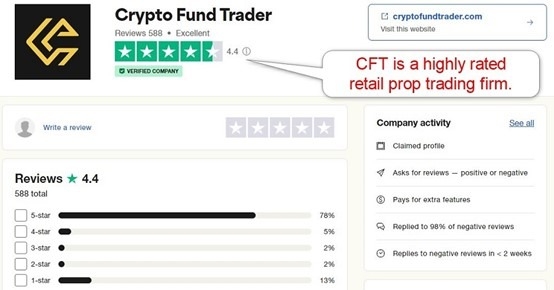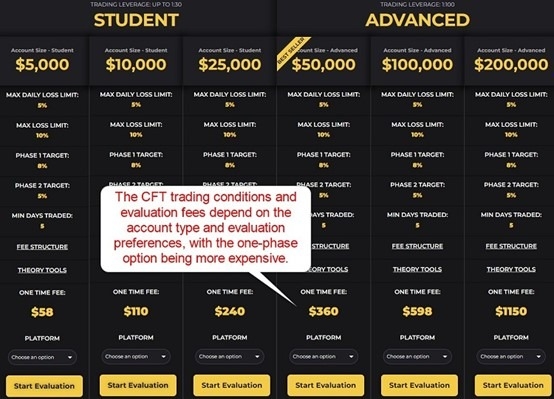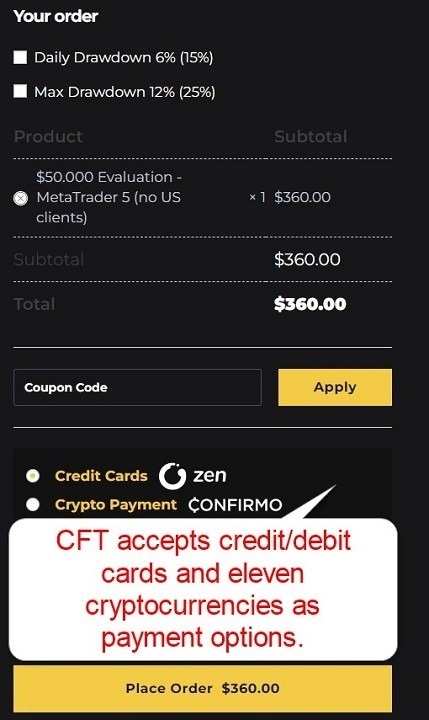Editor’s Verdict
CFT, founded in 2022 in Switzerland, prides itself on educating 30K+ traders and its $10M+ payouts to its prop traders. It offers six account types from $5,000, one-step and two-step challenges, and a profit share of 80%. I have conducted an in-depth CFT review to evaluate its trading conditions. Should you consider prop trading at CFT?
The Pros & Cons of CFT
Traders should consider the pros and cons of CFT. I have summarized the ones I found stood out the most during my CFT review.
Overview
CFT offers six funded account options from $5,000 for a $58 evaluation fee.
I like the absence of a time limit during the evaluation period, as it eliminates unnecessary time pressure on top of performance pressure. CFT offers raw spread trading from 0.0 pips with ultra-low commissions and a balanced asset selection of 200+ liquid trading instruments.
CFT Trustworthiness & Reputation
Trading with a prop firm, an unregulated business, requires traders to ensure that a trusted brokerage handles all accounts and that the prop firm maintains an excellent reputation among its prop traders.
Is CFT Legit and Safe?
CFT, founded in 2022, lacks operational history. It has a 4.4 out of 5.0 rating on Trustpilot based on 588 reviews.
My CFT review found several negative reviews about account deactivations and withdrawals, but I could not verify them. I advise traders to consider the negative comments skeptically, as they could come from traders who have failed the paid-for evaluation challenge or breached trading rules in funded accounts. Therefore, I cautiously rate them as a prop trading firm interested traders could try to establish a rapport with.

CFT Features
CFT follows best practices established across the prop firm industry, which continued its rapid expansion.
The most notable features of CFT are:
- One-step or two-step evaluation
- No time limits during the evaluation process
- A profit target of 10% for the one-step evaluation
- A profit target of 8 and 5% % for the two-step evaluation
- A minimum of five trading days during the evaluation
- A maximum daily drawdown of 4% and 5%
- A maximum drawdown of 6% and 10%
- 80% profit share
- Cryptocurrency withdrawals
- News and weekend trading
- Up $300,000 funded accounts per trader
Evaluation Fees & Profit-Share
Prop traders pay the one-time evaluation fee dependent on their desired funded account size and evaluation type. CFT has six funding options with one-step and two-step evaluations. Evaluation fees are between $58 and $1,250.
CFT allows traders to revive failed challenges if all trades have had an SL and no trade lost more than 2% of the account size. The costs range between $180 and $3,980.
Please note that traders cannot change the account value once approved, meaning if they qualify on a $5,000 account, they will manage a $5,000 portfolio. The profit share at CFT is 80%.
Minimum Evaluation Fee | $58 |
|---|---|
Maximum Evaluation Fee | $1,250 |
Profit-share | 80% |
The minimum evaluation fee at CFT for a $5,000 account is:
Type of fee | Fee (without discounts) |
One-time evaluation fee | $58 |
Monthly evaluation fee | $0 |
Hold-over-the-weekend | $0 |
Double leverage | Not applicable |
Stop-loss not required at trade entry | Not applicable |
Total fees for a $5,000 account | $58 |
Account Types
CFT offers six funding options and a choice of a one-step or two-step evaluation. The funded account types are $5,000, $10,000, $25,000, $50,000, $100,000, and $200,000. Prop traders can manage a maximum of $300,000. The maximum leverage is 1:30 for the first three account types and 1:100 for the rest. Add-ons to increase the daily drawdown to 6% and the maximum drawdown to 12% are available for an increase in the evaluation fee of 15% and 25%, respectively.
The Ascend accounts offer charitable contributions and scholarship awards that traders can redeem at CFT. While the idea sounds good, as a prop firm that caters to prop traders, I cannot recommend it to prop traders.
What are the Trading Rules at CFT?
The CFT evaluation begins after prospective prop traders choose their preferred evaluation account and pay the one-time evaluation fee. There is no time limit, and the profit target is 10% for the one-step evaluation and 8% and 5% for the two-step.
Violating the maximum overall loss rule results in a hard breach and cancellation of the evaluation. Potential prop traders can restart by paying the reactivation fee after a rule violation if they meet the select criteria outlined above.
The trading rules for the CFT evaluation are:
- 6% maximum loss from the starting balance for the one-step evaluation
- 10% maximum loss from the starting balance for the two-step evaluation
- 4% daily loss limit for the one-step evaluation and 5% daily loss limit for the two-step alternative
- A minimum of five trading days for the evaluation
Noteworthy:
- CFT will not grant access to live trading accounts
- Accepted prop traders will manage demo accounts, and the CFT software duplicates them in live trading accounts of CFT
- It enhances risk management and compliance for CFT

Trading Platforms
CFT offers the MT5 and CFT platform for non-US traders and Crypto Futures to US traders. Prop traders benefit from raw spread trading with ultra-competitive commissions. Index trading is commission-free. Forex traders pay $3.00 per 1.0 standard round lot, crypto traders 0.05% per trade, commodity traders 0.001%, and equity traders 0.004%.
MT4 | |
|---|---|
MT5 | |
MT4/MT5 Add-Ons | |
cTrader | |
Proprietary Platform | |
Automated Trading | |
Guaranteed Stop Loss | |
Scalping |
Education
While beginners should never consider prop trading, CFT prides itself on combining its education with prop trading success. It features tutorial videos, virtual classes, e-books, live streams, podcasts, and personal mentoring. Some traders may appreciate the educational content CFT provides, but since CFT is a prop firm, I am against targeting beginners who have no business in attempting prop trading.
Customer Support
Customer Support Methods |  |
|---|---|
Support Hours | 24/7 |
Website Languages |  |
During my CFT review, customer support was available via e-mail and live chat, and CFT notes that its usual response time to messages is less than one hour. I recommend the FAQ section, as it answers many questions. I am missing a direct line to the finance department, where most issues could arise.
How to Get Started with CFT
Interested prop traders can start the evaluation after selecting their desired package and paying the one-time fee.
Minimum Evaluation Fee
The minimum evaluation fee at CFT is $58 for the $5,000 two-step evaluation.
Payment Methods
Withdrawal options |   |
|---|---|
Deposit options |    |
CFT accepts credit/debit cards and cryptocurrency transactions.

Accepted Countries
CFT notes that it accepts traders from all countries.
How to Pay the Evaluation Fee?
Prop traders can pay their evaluation fee via credit/debit cards and cryptocurrencies. CFT accepts eleven cryptocurrencies.
The Bottom Line - Is CFT a Good Prop Firm?
I like CFT for its ultra-low trading fees, transparency concerning its proof of reserves of CFT emergency funds on the blockchain, and its trading platform choices. The evaluation conditions match established industry standards but exclude time pressure, and prop traders can purchase add-ons to increase drawdown limits. Therefore, I can cautiously recommend CFT to prop traders who wish to build a rapport with this Swiss-based retail prop firm. The CFT platform is a custom trading platform that connects to Binance for cryptocurrency traders. A crypto-funded trader is funded in cryptocurrencies, but Crypto Funded Trader, or CFT, is a retail prop trading firm that funds traders in fiat currencies. There are dozens of alternatives to CFT, and more retail prop firms open annually to cater to the rising demand. FTMO is one of the closest competitors. It depends on the requirements of traders and strategies, as various firms implement restrictions. CFT ranks among the retail prop firms with the least restrictions, lowest fees, and most favorable trading conditions, placing it among the best prop firms.FAQs
What is the CFT platform?
What is a crypto fund trader?
What is the alternative to Crypto Funded Trader?
Which prop firm is best?
